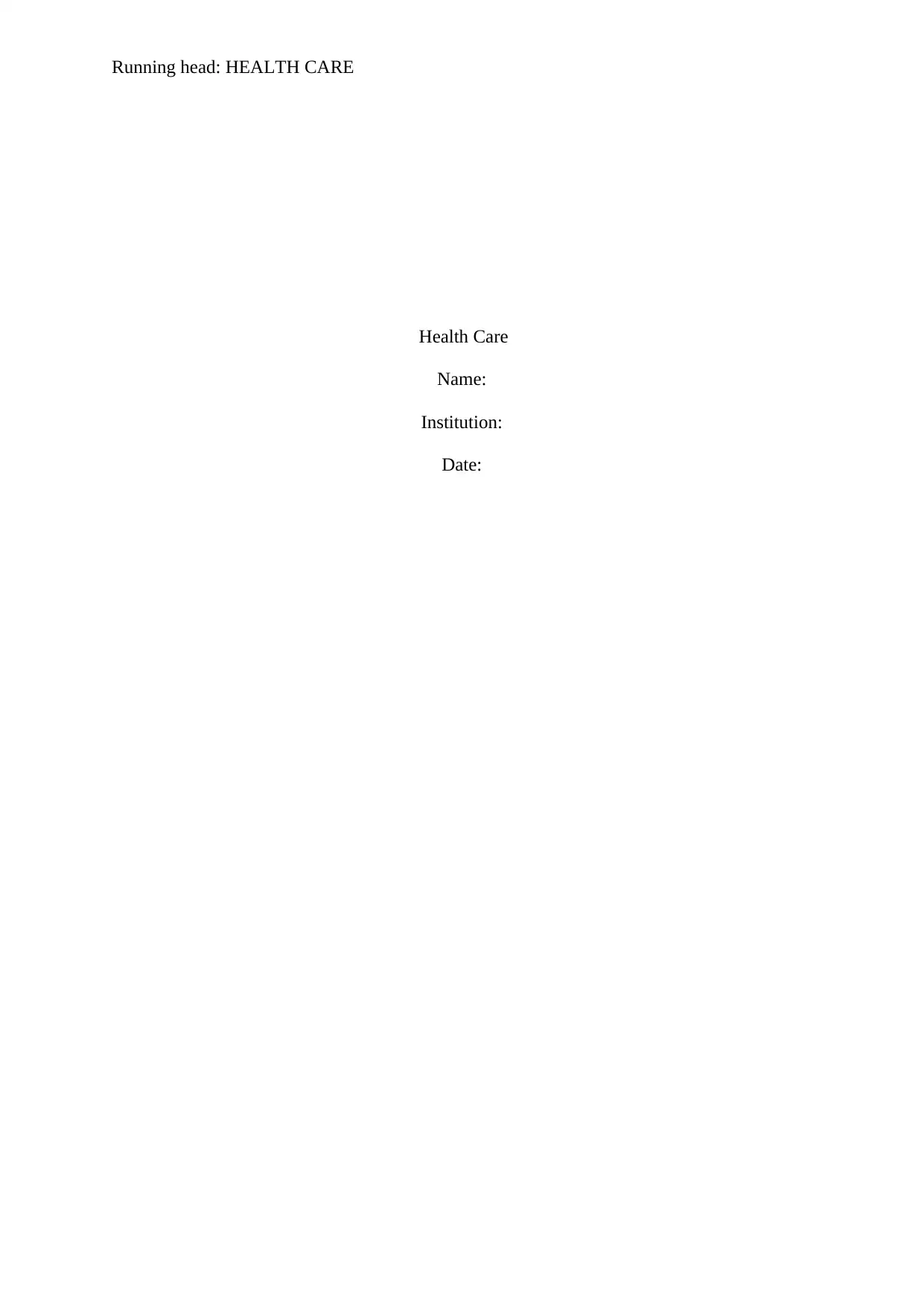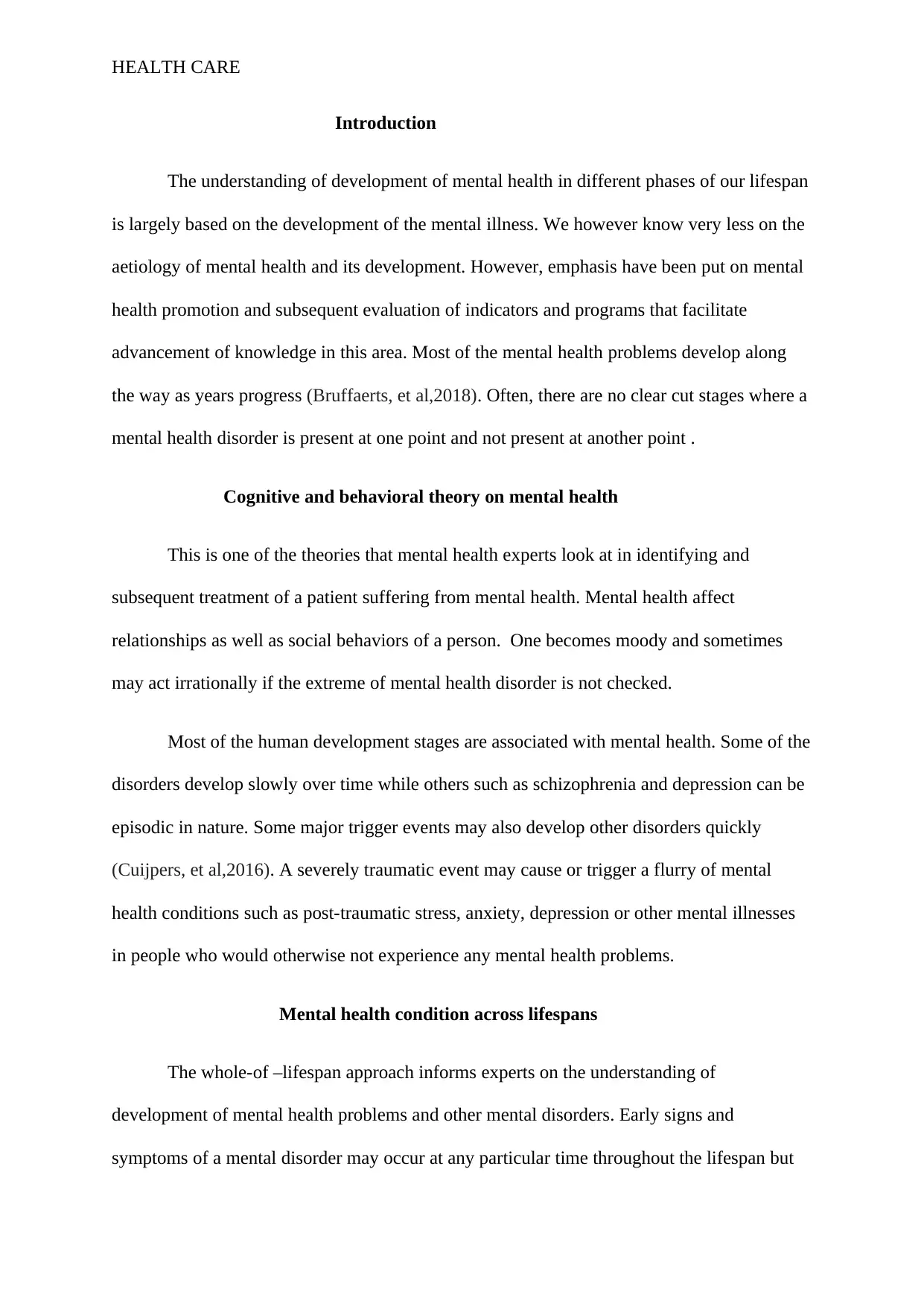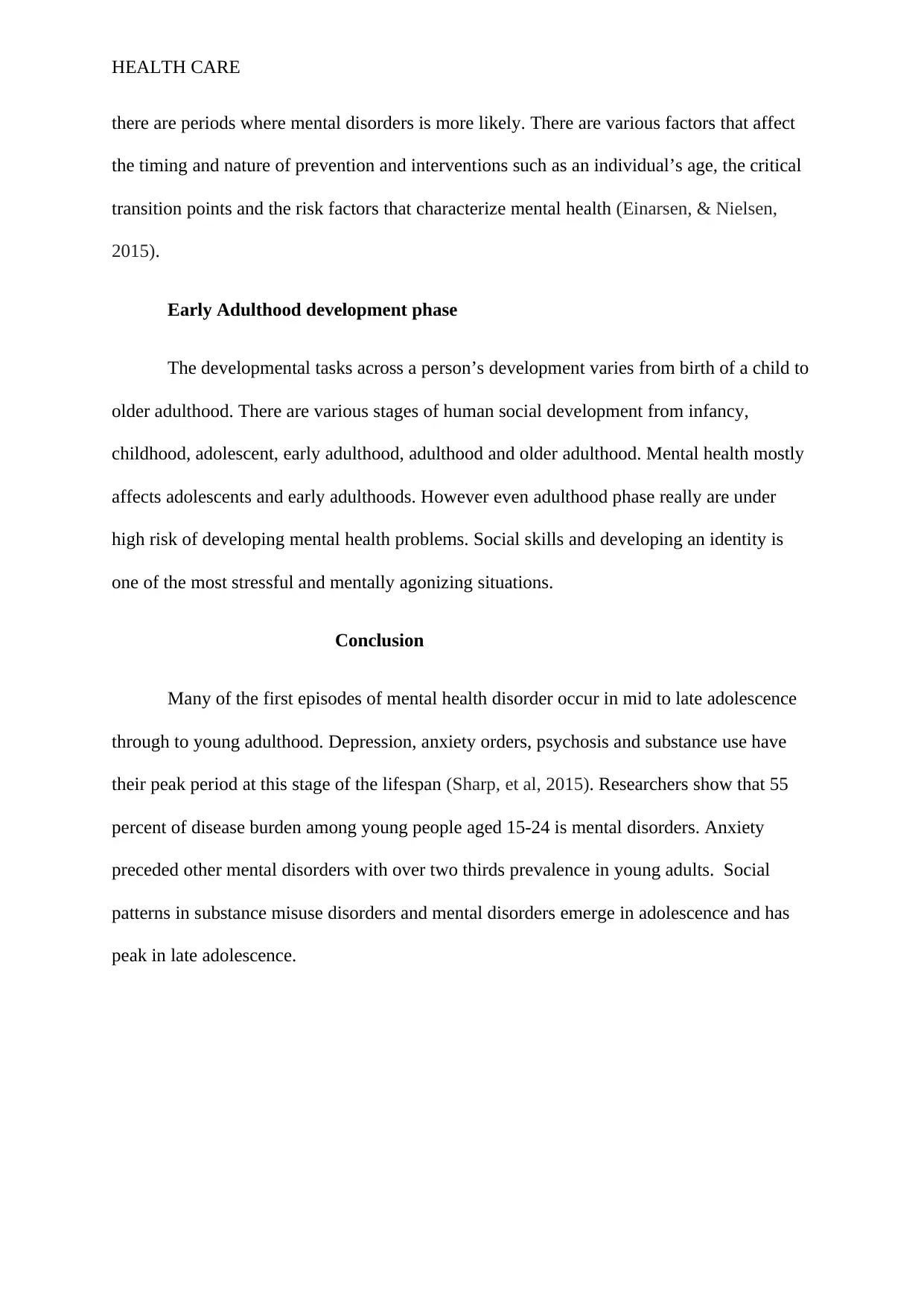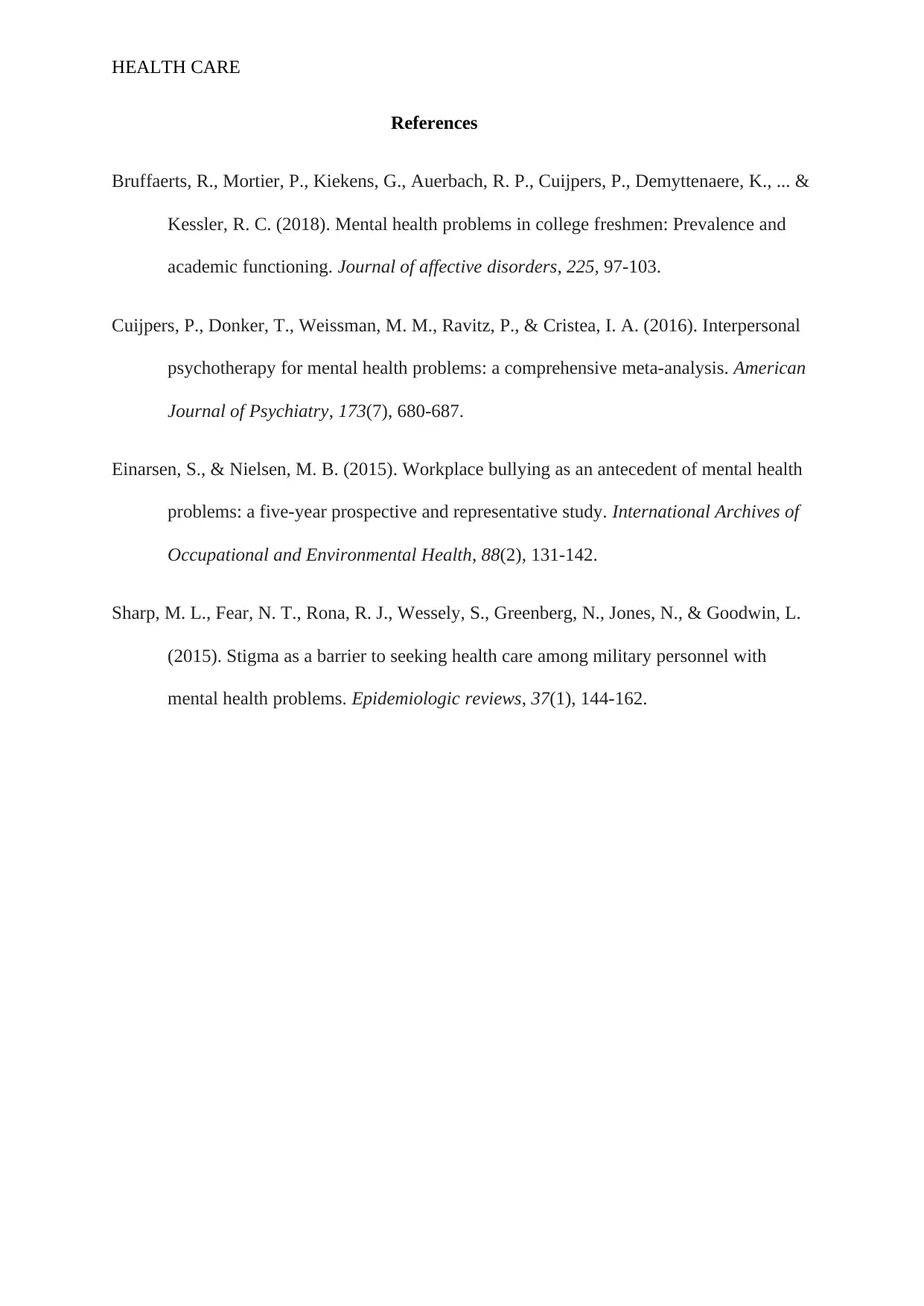SCU Online - Mental Health Across the Lifespan: Developmental Stages
VerifiedAdded on 2023/05/28
|4
|779
|190
Essay
AI Summary
This essay provides an overview of mental health across the lifespan, emphasizing the developmental stages and their impact on mental well-being. It discusses the cognitive and behavioral theories related to mental health, highlighting how mental health issues can manifest at different points in life, particularly during adolescence and early adulthood. The essay touches upon factors influencing mental health, such as critical transition points and risk factors, and references research indicating the prevalence of mental disorders among young people. The importance of understanding mental health development throughout life is underscored. Desklib offers a platform for students to access similar essays and study resources.

Running head: HEALTH CARE
Health Care
Name:
Institution:
Date:
Health Care
Name:
Institution:
Date:
Paraphrase This Document
Need a fresh take? Get an instant paraphrase of this document with our AI Paraphraser

HEALTH CARE
Introduction
The understanding of development of mental health in different phases of our lifespan
is largely based on the development of the mental illness. We however know very less on the
aetiology of mental health and its development. However, emphasis have been put on mental
health promotion and subsequent evaluation of indicators and programs that facilitate
advancement of knowledge in this area. Most of the mental health problems develop along
the way as years progress (Bruffaerts, et al,2018). Often, there are no clear cut stages where a
mental health disorder is present at one point and not present at another point .
Cognitive and behavioral theory on mental health
This is one of the theories that mental health experts look at in identifying and
subsequent treatment of a patient suffering from mental health. Mental health affect
relationships as well as social behaviors of a person. One becomes moody and sometimes
may act irrationally if the extreme of mental health disorder is not checked.
Most of the human development stages are associated with mental health. Some of the
disorders develop slowly over time while others such as schizophrenia and depression can be
episodic in nature. Some major trigger events may also develop other disorders quickly
(Cuijpers, et al,2016). A severely traumatic event may cause or trigger a flurry of mental
health conditions such as post-traumatic stress, anxiety, depression or other mental illnesses
in people who would otherwise not experience any mental health problems.
Mental health condition across lifespans
The whole-of –lifespan approach informs experts on the understanding of
development of mental health problems and other mental disorders. Early signs and
symptoms of a mental disorder may occur at any particular time throughout the lifespan but
Introduction
The understanding of development of mental health in different phases of our lifespan
is largely based on the development of the mental illness. We however know very less on the
aetiology of mental health and its development. However, emphasis have been put on mental
health promotion and subsequent evaluation of indicators and programs that facilitate
advancement of knowledge in this area. Most of the mental health problems develop along
the way as years progress (Bruffaerts, et al,2018). Often, there are no clear cut stages where a
mental health disorder is present at one point and not present at another point .
Cognitive and behavioral theory on mental health
This is one of the theories that mental health experts look at in identifying and
subsequent treatment of a patient suffering from mental health. Mental health affect
relationships as well as social behaviors of a person. One becomes moody and sometimes
may act irrationally if the extreme of mental health disorder is not checked.
Most of the human development stages are associated with mental health. Some of the
disorders develop slowly over time while others such as schizophrenia and depression can be
episodic in nature. Some major trigger events may also develop other disorders quickly
(Cuijpers, et al,2016). A severely traumatic event may cause or trigger a flurry of mental
health conditions such as post-traumatic stress, anxiety, depression or other mental illnesses
in people who would otherwise not experience any mental health problems.
Mental health condition across lifespans
The whole-of –lifespan approach informs experts on the understanding of
development of mental health problems and other mental disorders. Early signs and
symptoms of a mental disorder may occur at any particular time throughout the lifespan but

HEALTH CARE
there are periods where mental disorders is more likely. There are various factors that affect
the timing and nature of prevention and interventions such as an individual’s age, the critical
transition points and the risk factors that characterize mental health (Einarsen, & Nielsen,
2015).
Early Adulthood development phase
The developmental tasks across a person’s development varies from birth of a child to
older adulthood. There are various stages of human social development from infancy,
childhood, adolescent, early adulthood, adulthood and older adulthood. Mental health mostly
affects adolescents and early adulthoods. However even adulthood phase really are under
high risk of developing mental health problems. Social skills and developing an identity is
one of the most stressful and mentally agonizing situations.
Conclusion
Many of the first episodes of mental health disorder occur in mid to late adolescence
through to young adulthood. Depression, anxiety orders, psychosis and substance use have
their peak period at this stage of the lifespan (Sharp, et al, 2015). Researchers show that 55
percent of disease burden among young people aged 15-24 is mental disorders. Anxiety
preceded other mental disorders with over two thirds prevalence in young adults. Social
patterns in substance misuse disorders and mental disorders emerge in adolescence and has
peak in late adolescence.
there are periods where mental disorders is more likely. There are various factors that affect
the timing and nature of prevention and interventions such as an individual’s age, the critical
transition points and the risk factors that characterize mental health (Einarsen, & Nielsen,
2015).
Early Adulthood development phase
The developmental tasks across a person’s development varies from birth of a child to
older adulthood. There are various stages of human social development from infancy,
childhood, adolescent, early adulthood, adulthood and older adulthood. Mental health mostly
affects adolescents and early adulthoods. However even adulthood phase really are under
high risk of developing mental health problems. Social skills and developing an identity is
one of the most stressful and mentally agonizing situations.
Conclusion
Many of the first episodes of mental health disorder occur in mid to late adolescence
through to young adulthood. Depression, anxiety orders, psychosis and substance use have
their peak period at this stage of the lifespan (Sharp, et al, 2015). Researchers show that 55
percent of disease burden among young people aged 15-24 is mental disorders. Anxiety
preceded other mental disorders with over two thirds prevalence in young adults. Social
patterns in substance misuse disorders and mental disorders emerge in adolescence and has
peak in late adolescence.
⊘ This is a preview!⊘
Do you want full access?
Subscribe today to unlock all pages.

Trusted by 1+ million students worldwide

HEALTH CARE
References
Bruffaerts, R., Mortier, P., Kiekens, G., Auerbach, R. P., Cuijpers, P., Demyttenaere, K., ... &
Kessler, R. C. (2018). Mental health problems in college freshmen: Prevalence and
academic functioning. Journal of affective disorders, 225, 97-103.
Cuijpers, P., Donker, T., Weissman, M. M., Ravitz, P., & Cristea, I. A. (2016). Interpersonal
psychotherapy for mental health problems: a comprehensive meta-analysis. American
Journal of Psychiatry, 173(7), 680-687.
Einarsen, S., & Nielsen, M. B. (2015). Workplace bullying as an antecedent of mental health
problems: a five-year prospective and representative study. International Archives of
Occupational and Environmental Health, 88(2), 131-142.
Sharp, M. L., Fear, N. T., Rona, R. J., Wessely, S., Greenberg, N., Jones, N., & Goodwin, L.
(2015). Stigma as a barrier to seeking health care among military personnel with
mental health problems. Epidemiologic reviews, 37(1), 144-162.
References
Bruffaerts, R., Mortier, P., Kiekens, G., Auerbach, R. P., Cuijpers, P., Demyttenaere, K., ... &
Kessler, R. C. (2018). Mental health problems in college freshmen: Prevalence and
academic functioning. Journal of affective disorders, 225, 97-103.
Cuijpers, P., Donker, T., Weissman, M. M., Ravitz, P., & Cristea, I. A. (2016). Interpersonal
psychotherapy for mental health problems: a comprehensive meta-analysis. American
Journal of Psychiatry, 173(7), 680-687.
Einarsen, S., & Nielsen, M. B. (2015). Workplace bullying as an antecedent of mental health
problems: a five-year prospective and representative study. International Archives of
Occupational and Environmental Health, 88(2), 131-142.
Sharp, M. L., Fear, N. T., Rona, R. J., Wessely, S., Greenberg, N., Jones, N., & Goodwin, L.
(2015). Stigma as a barrier to seeking health care among military personnel with
mental health problems. Epidemiologic reviews, 37(1), 144-162.
1 out of 4
Related Documents
Your All-in-One AI-Powered Toolkit for Academic Success.
+13062052269
info@desklib.com
Available 24*7 on WhatsApp / Email
![[object Object]](/_next/static/media/star-bottom.7253800d.svg)
Unlock your academic potential
Copyright © 2020–2026 A2Z Services. All Rights Reserved. Developed and managed by ZUCOL.




